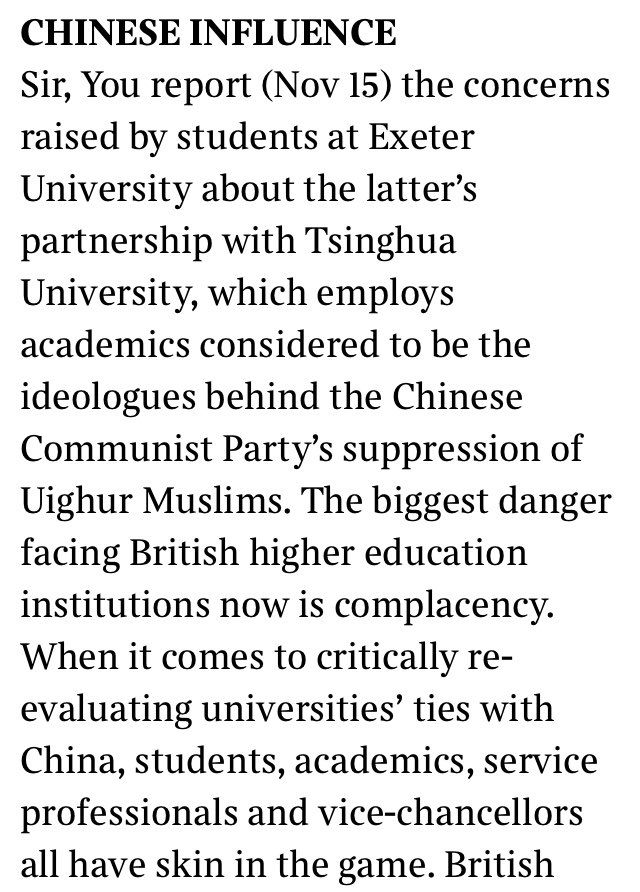
2021 was a turbulent and yet productive year. I am happy that I could publish numerous op-eds, a policy primer and two academic articles. I hope that you found some of the texts thought provoking. A short thread 🧵 with links to my publications of 2021. 1/13 

Fulda (2021), Wissenschaftsautonomie wahren. China und die Wissenschaft in Großbritannien, APuZ, 12 February 2021. 2/13
bpb.de/apuz/326885/ch…
bpb.de/apuz/326885/ch…
Fulda (2021), Für einen Paradigmenwechsel in der deutschen Chinapolitik, China.Table, 6 April 2021. 3/13
table.media/china/standpun…
table.media/china/standpun…
Fulda (2021), Mehr Mut zur China-Kritik trotz möglicher Nachteile, Brennpunkt Tibet, 23 June 2021. 4/13
https://twitter.com/AMFChina/status/1407575395835187202?s=20
Fulda (2021), Why the Chinese Communist party fears its bloody history, The Spectator - UK/USA, 3 July 2021. 5/13
spectator.co.uk/article/why-th…
spectator.co.uk/article/why-th…
Fulda (2021), Rote Linien längst überschritten. Plädoyer für eine Neuorientierung der deutsch-chinesischen Wissenschaftskooperation, Forschung & Lehre, September 2021. 6/13
forschung-und-lehre.de/politik/rote-l…
forschung-und-lehre.de/politik/rote-l…
Fulda and Heathershaw (2021), University Governance and Academic Freedom, Academic Freedom & Internationalisation Working Group, September 2021. 7/13
hrc.sas.ac.uk/sites/default/…
hrc.sas.ac.uk/sites/default/…
Heathershaw, Fulda and Chubb (2021), Vice-Chancellors should welcome staff participation in the governance of their university’s international partnerships, LSE blog, 1 October 2021. 8/13
blogs.lse.ac.uk/impactofsocial…
blogs.lse.ac.uk/impactofsocial…
Fulda (2021), Defending academic freedom in Germany will require decisive political leadership, University
World News, 7 October 2021. 9/13
universityworldnews.com/post.php?story…
World News, 7 October 2021. 9/13
universityworldnews.com/post.php?story…
Fulda (2021), Why Germany has less to teach the UK than most think, The New Statesman, 19 October 2021. 10/13
newstatesman.com/world/europe/2…
newstatesman.com/world/europe/2…
Fulda and Missal (2021), Mitigating threats to academic freedom in Germany: the role of the state, universities, learned societies and China, IJHR, 21 October 2021. 11/13
tandfonline.com/doi/full/10.10…
tandfonline.com/doi/full/10.10…
Fulda and Missal (2021), German Academic Freedom Is Being Decided in Beijing, Foreign Policy, 28 October 2021. 12/13
foreignpolicy.com/2021/10/28/ger…
foreignpolicy.com/2021/10/28/ger…
Fulda (2021), Studie zu China-Berichterstattung ignoriert die politische Realität, China.Table, 8 November 2021. 13/13
table.media/china/standpun…
table.media/china/standpun…
Fulda (2021), The Chinese Communist Party’s
Hybrid Interference and Germany’s Increasingly
Contentious China Debate (2018-21), Journal of
the European Association for Chinese Studies, Vol.
2 (2021): 205–234. Published on 30 December 2021.
Hybrid Interference and Germany’s Increasingly
Contentious China Debate (2018-21), Journal of
the European Association for Chinese Studies, Vol.
2 (2021): 205–234. Published on 30 December 2021.
https://twitter.com/AMFChina/status/1476808602786619413?s=20
• • •
Missing some Tweet in this thread? You can try to
force a refresh










